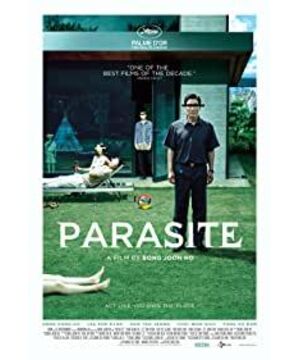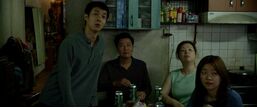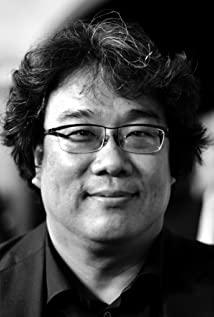If you want to perform and explode "Parasite" with strength, then you can use Orson Wells's genius sentence——
This is not only the best Korean movie ever, but it will be the best movie in Korean movie history from now on.
It's a pity that the words rested on Bong Junhao's body, and it was not very easy to establish .
Because he was the director who made "Memories of Murder" and was named the best movie in Korean history and hit the TOP list of world movie history.
Furthermore, there is a direct dialogue between "Parasite" and Korean film history-Bong Joon-ho is also a believer of Kim Ki-young's "Second Girl".
And, for a long time, even if it was halfway through the film, I was muttering: The title "Parasite" doesn't sound too advanced.
This article involves spoilers, please read carefully
Certainly some people think that "Parasite" surpasses "Memories of Murder". Just as no matter how good "Burning" is, there are also many fans who believe that "Burning" cannot represent Li Cangdong.
More people even think that "Parasite" or "Burning" are not so good.
Watching "Parasite", I will think of "Burning" and "The Thief Family" from time to time (explained below).
This must not be due to similar years.
It's like Bong Jun-ho also incarnates as a fan, and has written a letter of enthusiastic praise of Hirokaeda, and "Parasite" or "The Thief Family" are all reminiscent of Imamura's low-level insect movies. As for the climax scene of "Parasite", that knife is not a popular interpretation of Kurosawa Kiyoshi's "X Sage".
▲It is Hirokazu and Bong Joonho who left Palme d’Or in Asia before and after
There is another association, which is definitely a fan of Korean film fans.
That was the golden driver Song Kanghao, who appeared as an old driver and was praised for his good driving skills in corners.
Watch a group of movie viewers of Bong Joonho’s works in South Korea:
"Memories of Murder" (5.25 million)
"Monster" (13.01 million)
"Mother" (2.98 million)
"Snow Country Train" (9.35 million)
"Parasite" (10 million)
Bong Joon-ho can not only win the Cannes Palme d’Or, but also produced the best film in his country's film history, and he has tens of millions of Koreans (total equal to the total population of South Korea) to pay the bill.
This is probably the highest glory that a living film director can enjoy. As for the commercial art that is often used to lead the war, the party is the same across the board, who cares. Do you want? That's for you.
Bong Joonho doesn't need a label. But his life has not been smooth sailing.
If you have the opportunity, recently went to the Hong Kong Summer International Film Festival and saw the first feature film "Kidnapping a Dog at the Door" , you can hardly believe that after three years, this guy will be able to shoot "Memories of Murder" .
▲The Kidnapping of a Dog at the Door, 2000
In the "Snow Country Train" era, Bong Joon-ho had almost bet on all his wealth, and together with his base friend Park Chan-wook, he gambled on big science fiction.
If the result is not bad or not, the tuition is deemed to have been paid.
Then, "Yuzi" , which was hand-in-hand with Netflix , was besieged by many Chinese film critics, and was relegated to "environmentalism or animal protectionism at the ideological level of middle school students." It was obviously unsuccessful.
It can be said that Feng Junhao's creative experience in 2010s used failure as a flower, and "Parasite" was the final result.
After I hit a five-star hammer, Li Yang, a teacher who watched "Parasite" in Hong Kong, announced that he poured out the first cold water, saying that the rich should not be so stupid (the score still has four stars).
The rich are "stupid," and I wonder if the poor are too smart in the movie.
I can't believe it, so "smart"-after all, kidnapping and stealing is also a survival trick. Why would a family of four with diligent legs endure such a basement and watch the passers-by pass through the bottom of their lives in horror.
The interesting thing is that the Golden Driver's family and the Dungeon House both participated in the same failed investment (Taiwan's ancient pastry cake shop), and it really is a chain.
In this way, when you are thinking about who is stupid and who is smart, Teacher Li Yang or I have fallen into Bong Junhao's trap .
You will compete with the director at the very beginning, and guess that it is definitely not the way or just that at the end. Finally, the director gave Daigo a lesson about initiating, splashing water in the street, and flooding like a tiger.
"Parasite" is of course a story about the class gap (the only solution seems to be a typical Western society, turning into a pot-bellied frog, and the middle class becoming the backbone of society).
In the first half of "Parasite", when you are trapped in the dramatic conflict between rich and poor, you can think of the following story modes:
1. A replaces B (dove occupy the magpie's nest drama)
2. B anti-kill A (old-fashioned suspense film)
3. B turned out to be A (satire)
4. Jurong or Jurong (comedy or horror film)
Unexpectedly, the next development of "Parasite" is that if A and B are visible modern worlds, then there will be a deeper, darker, invisible group.
The second half of the movie is sixty minutes long, with no loose twists and turns, and mercury floods.
When the housekeeper suddenly rang the doorbell, the surveillance camera showed a face that was almost frantically deformed, lightning and thunder.
A good show began.
For one thing, it was a ghost knocking on the door in the middle of the night. Both the audience and the family were surprised.
The gone tutor is like a driver who asks to go. They are all cutscene characters and will not have a second chance to show their faces. The housekeeper turned around and asked to join the story.
What is she trying to do?
Obviously, in the torrential rainy night, the biggest variable the audience can think of is that the owner suddenly returns, but they don't think that there can be other people, and the person who knows everything inside the house best, first step, the killer will come back.
One side was gloomy, and the Nether Tunnel appeared, with the carrion green atmosphere standard in horror movies.
The underground maze, with its own corners, never ends, a closed space like "Old Boy".
In an instant, this "Parasite" quietly turned into a thriller.
▲Park Chan-wook, "Old Boy", 2003
The one who opened the iron gate of that heavy mechanism was a funny one, the whole person was supported in the air, like Sisyphus pushing a boulder.
When the audience and the family were thinking of destroying the corpses and concealing people's eyes, the cell phone signal in the damn basement was actually very good-another irony.
The film was caught off guard and turned into a political satire about non-nuclear and world peace in the superb performance of the broadcaster of the Northern Dynasties.
In the second half of the movie, Feng Junhao skillfully completed the pouring of the type of concrete. No, it should be precision forging of stainless steel alloy.
Then they hide under the host’s sofa like cockroaches. Blended with clockwise sexual teasing, resentful humiliation, and fearful exposure of danger, "Parasite" can hold their breath and tease the audience, so that timid audiences want to escape on the spot more than a family. Embarrassing.
Song Kanghao's expression changed, and he dragged his body, legs and big black feet like a bug, trying to move to a dark corner. Perceived that the surrounding movement is dangerous, he can only remain motionless and fall into a state of suspended animation of "tense tonicity". The 502 super glue acting like a cockroach is completely possessed.
Outside at this time, there was a torrential rain and a flood hit.
They fled, down and then down, and found that the flood washed the nest.
There is no more scene in the film, where the slums are flooded, the sewers are poured, the black water is gushing from the toilet, and the tranquility of the big house, thanks to the beautiful rainy night, are juxtaposed, making the poor look like a bug.
In Bong Junhao’s parallel editing here, the events in the two spaces are intertwined, and the application is superb.
So, whether the poor must become rich, even if it is just an underground dream of thanking the president for his great kindness.
The class consolidation in "Parasite" is still not as good as what "Burning" said, which is unimaginable.
The poor are naturally parasitic at the door of the rich man’s house. However, the rich also rely on the poor for cooking, driving, educating their children, and taking care of their rooms.
From the perspective of human animals with diligent limbs, the poor in "Parasite" are more like "people" than the rich-because they want to live better.
What about the rich? They do not need to think about this issue. Think about what the term silly white sweet comes from, and you can roughly understand what the movie is about to say.
The noble lady is pampered, stays away from the society, becomes a good wife and good person, steaming a spiritual void.
Money is like an iron, it can iron people without a trace of wrinkles.
If I had money, I would be kinder than them.
Such incisive, old-fashioned lines will soon become popular—appearing on your movie calendar next year.
In "Monster", Bong Joon-ho introduced South Korea's national sport: archery to movie fans. A flash of hammer appeared in "Parasite".
Hammer throw is a throwing sport in track and field. Yuan Mobilization drags the iron ball, starting from the soles of the feet, the person, the line, and the ball are integrated, spinning, accelerating, spinning, and accelerating. Finally, they drink hard and get out, throwing them farther than anyone else.
The interesting thing is that "Parasite" is also a movie that works from the bottom up.
When the iron ball turns faster and faster, it will eventually be thrown out.
After going through the qi and blood, the brain was dizzy, and finally he returned slowly. Dust returns to dust, soil returns to soil.
Roughly speaking, it can be considered that "Parasite" is revolving around these things——
Stone
"It's not that I took this stone, it's the stone that followed me tightly."
The appearance of the stone has some origins.
"Parasite" just entered Cannes and broke into other people's homes. I first thought of Pasolini's "Theorem", Miike Takashi's "Visitor Q" (throwing a stone at a man), and Lansmos's "Dog" tooth".
Facts have proved that "Parasite" is just Feng Junhao's "Parasite".
The stone in the first half appeared as a token of luck. Kistler, summon the whole story.
It was donated by classmate Min Hyuk, allowing the family to enter President Park’s Dafu home and enjoy the sunny lawn, large French windows, and the upper-class life of the urban forest in the spacious architect space.
A more appropriate explanation, the stone is another stepping stone .
A family needs the height of this stone to enter the upper-class residences with large windows and good sunlight.
The stone gets taller and taller, and the stone rolls bigger and bigger. When pushing the iron gate like a huge boulder, they followed the invisible stone, rolled down to the bottom of the mountain, returned to the basement, and were beaten out of their original shape.
Why did the son take the stone back, instead of choosing a knife, an iron rod, or an axe?
The poor who entered the upper-class home eventually regarded the stepping stone and the pushing boulder as part of their body, so that they could not give up and were unwilling to fall.
Perhaps this kind of explanation is softer than taking the stone as a heart disease or a murder weapon for granted.
The stone in the second half tried to become a murder weapon without success. The stone is no longer a stone. At the same time, the line at the beginning appeared: It was not I who carried this stone, it was the stone that entangled me tightly.
In the end, the stone sank to the bottom of the mountain stream, and the family paid the price.
odor
The smell of the subway is the smell of the poor.
"I am not a god of medicine" said that the disease that Chinese people suffer from is poverty. However, the film does not reveal the root cause of poverty, which lies in vested interests, class consolidation, institutional dysfunction, and uneven distribution.
Many people will deduce a similar sentence in "Parasite": being poor is a sin. Bong Junhao is not so stupid as to use his lines, he chose the smell that is not visible on the movie screen.
It can arouse people's imagination, with a natural derogatory color, and remind you of poverty, embarrassment, bottom and uncleanness.
The taste of instant noodles on the hard seat of the train, braised beef or old sauerkraut. Taxi drivers from the outskirts of Beijing can always smell a northern atmosphere in the back seat that is too lazy to take a bath.
The last thing you might have encountered when you put yourself on the ground comes from a basement where there is no light, poor ventilation, and the air is like mold.
Just like the beginning and end, the smelly socks hanging in the middle of the lens-when you look at it for the second time, the smell will definitely come out.
The smell is the sense of smell.
Vision is the image of characters and clothes.
The bottom family of "Parasite" transformed and packaged their own identity and image. They only need to be decent, and they don't realize that the bottom layer is the imprint that cannot be removed.
What can distinguish between human groups and classes is language, which comes from hearing. It is not necessarily a dialect, but includes buzzwords and foreign languages.
Language represents the range of objects a person can communicate with, so in the first half of the movie, there are constant plastic jokes like Kevin, Jessica, and Speaking English.
The Korean peninsula is not very large, and the Golden Driver’s family has successfully concealed it. It is as simple as the two brothers and sisters who are now learning how to speak.
In the end, it was in the smell that they were seen through by a child.
The reason why the smell is difficult to prevent, and the behavior of crossing the boundary and crossing the line is staged at any time, because it is an invisible particle that diffuses to every corner of the space.
There is also a hidden smell in the film, which is sex, desire, and hormones. Its occurrence and flow are unimpeded between the upper and the bottom.
The underpants in the back seat of the car stirred up the passion of the couple on the sofa. The love germinated by the little girl and the tutor is a sweet youthful kiss.
Even the couple in the dungeon can't live without Dunlun's condom (a close-up). Compared with the critical taste of the poor, it is obviously a premium taste suitable for all ages.
architecture
It is said that a good film director is like an architect. Oshii Mamoru and the like think that to be a director is to lead a military operation and lead a war.
"Parasite" is obviously a movie that is related to buildings and is full of architectural thinking.
The mansion left by the Japanese architect is highlighted. Quiet in the noisy, it is the back garden in the bustling city.
The location of Driver Jin's family also impressed me. By looking for the WiFi signal, it brought out the indoor layout, and the toilet that was above everything else (what an unforgettable design!).
Different viewers' perspectives will also get different information from the movie.
Someone is affected by the building itself, big and small, up and down. The houses of the poor keep going down, to the houses of the rich, from the slope to the stairs, all the way up.
At the beginning of the first shot, the family lived in a semi-basement, separated by a window, almost level with the ground, and you could see passers-by on the road and the landscape of half of the soil.
This position of perspective, like a camera that falls straight down on the face of a son, illustrates their situation. You will soon understand that it is also the perspective of a bug, hiding in a corner, hibernating under the surface of the earth.
Before night comes, drunks like to pee under their noses. They were so lazy that they didn't even want to clean the room. They waited for the disinfectant spray to pour into the room.
This family is not noticed, and they don't want to go out to work, and have too much relationship with the outside society (see the visit of his son's friend Min Hyuk).
The semi-basement with shabby windows reminds me of the heavy rain in 2012 inexplicably.
Some people drowned on the second ring road (because of the low ground under the overpass and there was water), and some people lived in the basement and were flooded. Many residents suddenly discovered that there were some strange sheets to dry in the community, and it turned out that there were really invisible groups around them.
More friends have said that she went to visit someone living in the basement, a wandering singer. She said that the basement was going to go down one floor after another, so deep that she suspected it would lead to the center of the earth.
It is said that in the imperial capital, one million people live in a similar bunker maze. After that, a series of actions drove many of them away.
The psychological changes caused by the architectural space were also completely released in the heavy rain.
The audience followed the movie characters into the dungeon, and was subdued to the ground, unable to get out. When they finally escaped from the upper-class homes, such as the heavy rain and the empty city, they also played the role of cathartic release.
As a result, they returned to the Gu worm home, only to find that the catastrophe was overwhelming.
Rhythm
The rhythm of "Parasite" has a sense of existence since the CJ LOGO appeared on the screen.
In "Burning", Ben has a classic line. You have to feel the voice of Beth from the depths of the bones to be alive.
▲Li Cangdong, "Burning", 2018
Many people still can't forget the big knife of business and art, thinking that the reason why "Parasite" is commercial and its type should be attributed to its rhythm.
It's so good, how can it be reversed, accidental, exciting, and designed one after another.
You see, the excuses my daughter has compiled are comparable to the good voices of Korea. The son suddenly grabbed the hand of the little girl in question 24 of the review answer sheet, and talked about the order and rhythm of the questions, and he was clearly a mental teacher.
Then from English tuition teacher, home art teacher, driver, butler, come first, then recommended by acquaintances.
The duo in the dungeon not only made the Golden Driver's family a prototype, but also shattered their one-night fantasy of becoming a family home.
The pain of being killed for the president and daughter is relatively simple, without extra sympathy, but without catharsis. It happened under the sun and triggered the next crime on the spot.
Here, I suggest everyone to review the masterpiece of Director Kiyoshi Kurosawa that Bong Junhao has touted all the year round: "X Sage".
▲ Kurosawa Kiyoshi, "X Shengzhi", 1997
Many people will definitely be puzzled. No matter how much Kim Driver complains to the president, he won't be able to hold a knife to each other.
That scene is very much like a picture in a famous literary or film history: killing people because the sun is too dazzling. The two men fell into a high level of mental tension in the face of the safety of their respective family members. One was at a loss, the other wanted to drive away.
At the moment, it seemed as if the Golden Driver, who was hypnotized, had to answer "Who am I" one after another. He remembered his family status and was awakened to the poor class status.
I am a golden driver. No, I am a father. No, I am a poor man!
"X Shengzhi" says that if a person thinks from the heart that killing is immoral, then even if he is hypnotized, he will not kill.
When the climax of the conflict scene in "Parasite" arrives, Driver Kim is awakened, and it is his second personality. Outside of social personality, he does have the barbaric urge to harm others and kill the upper class, and he may not even know him.
▲ "Memories of Murder" VS "Parasite"
Feng Junhao uses such a cautious way to express his pessimistic attitude towards society. After all, looking back at the movie itself, the director was not too partial to any camp.
The dungeon man has a beautiful speech.
He thanked President Park and said that as time passed, he became confused and could not remember how long he lived in the dungeon (in fact, he knew it very clearly).
It is clear that he seems to have lived in it since he was born (this is a contradictory sentence that goes from end to end).
When you get back to your senses, you can easily find that the Golden Driver's family who overwhelmed the host, and the dungeon house that was hunted for debt are grasshoppers on the same rope, and they have fallen into the same embarrassment.
Then in the dungeon, Driver Jin started to do the same thing as the dungeon man, thanking President Park for sending out the Morse code.
Ever since, Driver Jin took the knife, completed the task of the dungeon man, and disappeared without a trace in broad daylight under everyone's eyes.
This is the narrative mystery circle carefully crafted by "Parasite", just as the stone is picked up and put down, the first shot and the last shot of the film are also neatly opposed.
Even the sunny dreams made by his son are in the upper class and sit in the house. But what goes down is to go down eventually.
☉
The first time, I was surprised that he was hit so hard by the stone that he was able to escape, and he was still laughing.
On the second time, I think that the story of "Parasite", the scene where Driver Jin took the knife, has already ended.
As for the latter, it was another hypnosis, or another dream, just an attempt to heal after the Blood and Light Disaster.
These last words have absolutely nothing to do with rhythm.
I wish everyone a happy watching, two brushing, and three washing.
View more about Parasite reviews











